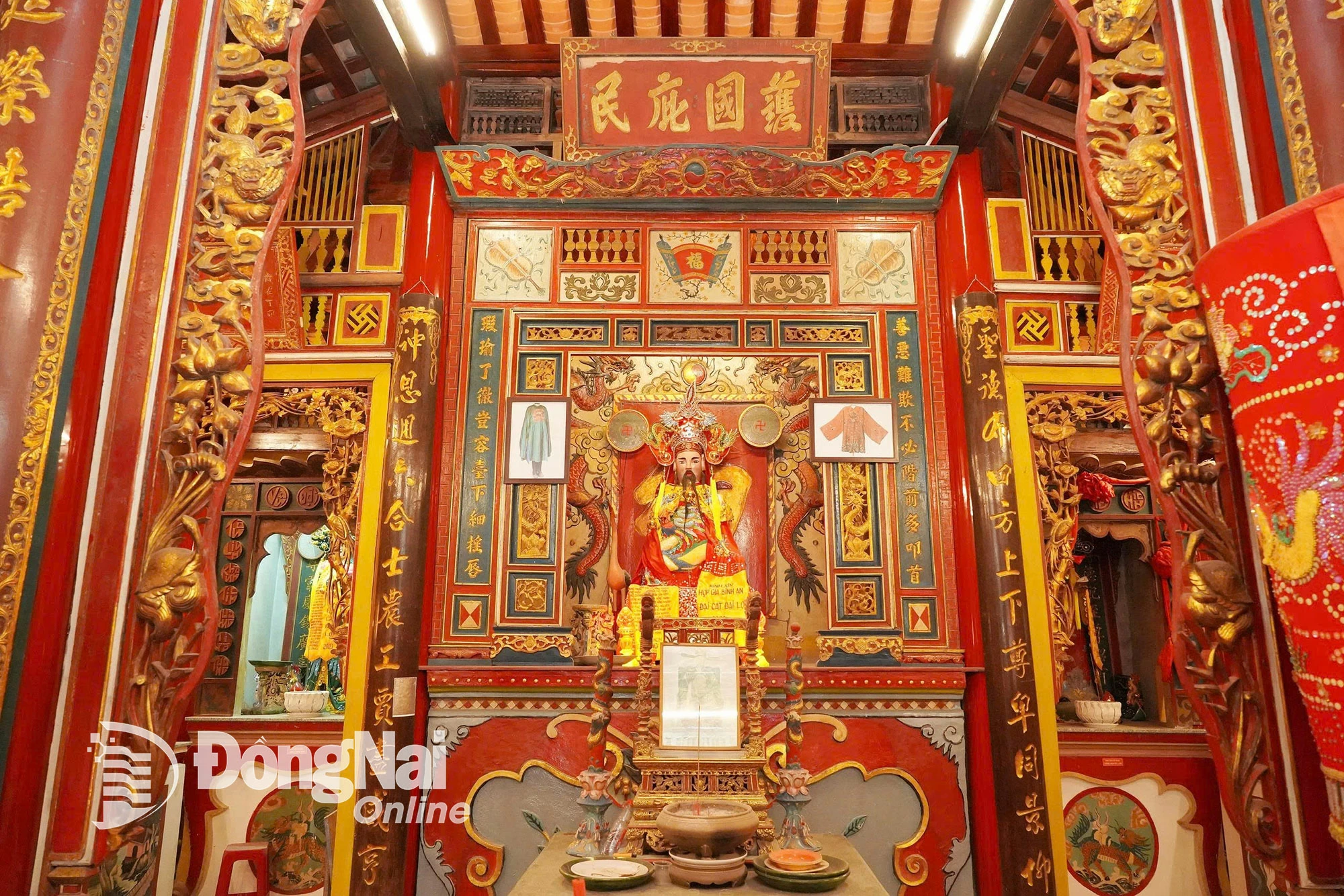 |
| The altar of famous general Nguyen Tri Phuong in the main hall. Photo: Phan Van Thanh |
A life devoted to the country
During his 53 years as an official under three kings: Minh Mang, Thieu Tri and Tu Duc, he was always a devoted and highly respected mandarin, holding many important positions in the Nguyen Dynasty.
Serving as an official under King Minh Mang (1820-1840), in 1833, an incident occurred in the Southern region, which was the resistance of Le Van Khoi who raised an army against the Nguyen Dynasty to occupy Phien An citadel, causing Gia Dinh to fall into a state of mutual destruction and chaos. In 1835, Nguyen Tri Phuong was sent to Gia Dinh with the generals to attack the citadel to quell the rebellion. Faced with the resistance of Le Van Khoi's army and the reinforcements of Siam, with a thorough overview, he sent scouts to grasp the enemy's situation before proposing a plan to attack the citadel. After that, he commanded the soldiers to directly attack and recapture Phien An citadel, restoring a peaceful life to the people.
Dong Nai people are honored to worship the famous general Nguyen Tri Phuong as a god of fortune at My Khanh communal house on the right bank of Dong Nai river with all sincerity and gratitude for his merit in opening and protecting the ancient land of Tran Bien. |
During the reign of King Thieu Tri (1841-1847), Nguyen Tri Phuong again took on the responsibility of pacifying the western border of the six provinces of Cochinchina for 7 years. At that time, the Siamese army colluded with bandits from Ba Xuyen district in An Giang to rebel many times. The King appointed him as An Giang Governor, assistant to the Governor General of An Ha, and commander-in-chief of the army to suppress the above rebellions and mobilize troops to pacify Cambodia.
From the time of King Thieu Tri to the time of King Tu Duc (1848-1883), Nguyen Tri Phuong devoted himself to the court, a very important task that few people know about for a long time, which was the achievement of opening up the land of Cochinchina (1850-1857). When he entered the capital, Nguyen Tri Phuong implemented the policy of attracting migrants and expanding the settlements, establishing plantations, bringing back and recognizing the ownership of the land that they had worked hard to reclaim, freeing them from the oppression and exploitation of the powerful landlords, exempting people from taxes in the years when the plantations were newly established, and continuing to exempt taxes and postpone soldiers for many years in places where they had not collected effectively. Thanks to that, the people recovered, creating hundreds of more villages next to each other. Nguyen Tri Phuong also planned and established from the beginning pre-arranged battlefields, permanent defense forces, effectively responding to attacks by foreign invaders when necessary. It can be said that the plantation policy created a force that could hold a plow or carry a gun, cling to the land to increase production, and when necessary, sacrifice blood and bones to protect the country.
A resilient spirit
In the history of the Nguyen Dynasty's resistance against French colonialism in the second half of the 19th century, Nguyen Tri Phuong was a famous general representing the national spirit, determined to fight the French on all three fronts: Da Nang (1858-1860), Gia Dinh (1860-1861) and Hanoi (1873).
In 1858, Nguyen Tri Phuong was appointed by King Tu Duc as the President of Quang Nam Military Region/Commander-in-Chief of the Army and sent to the Da Nang front to fight the French. He showed a determined attitude to fight the enemy, with the strategy of both building a solid defense line, evacuating people to implement the "empty houses and empty gardens" plan, and fighting a guerrilla war to gradually wear down the enemy's strength. Although the enemy was strong and we were weak, many times the outer defense line was broken, he still held on firmly, blocking and attacking, making the French colonialists have no way to expand the area of occupation, unable to carry out the plan of a quick victory, on the contrary, the French army encountered difficulties. Therefore, on March 23, 1860, the entire French army quietly withdrew from Da Nang.
When he was sent to Gia Dinh to fight the French, his attitude towards the enemy was summed up in the sentence "I only focus on fighting and defending. Why believe their lies and fall into their trap?". He was appointed by King Tu Duc as the President of the Gia Dinh Military Affairs, the Grand Minister of the Gia Dinh Military Region, to command the army to fight the enemy and protect the land of Nam Ky. Here, he implemented the policy of pacifying the people, focusing on production, building ramparts, leading the army and people to attack the camps to reduce the fighting spirit of the enemy.
Finally, on the Hanoi front, in 1872, despite his old age, Nguyen Tri Phuong was still trusted by King Tu Duc, appointed as the Imperial Commissioner of Dong Duc and sent to Bac Ky to resolve conflicts between military authorities.
Over the past hundred years, the people have erected monuments and temples to the famous general in many localities. Nguyen Tri Phuong’s name has been recorded in history to this day, and many streets, schools, and hospitals… across the country have been named after him.
Xuan Nam
Source: https://baodongnai.com.vn/dong-nai-cuoi-tuan/202507/nhan-225-nam-ngay-sinh-danh-tuong-nguyen-tri-phuong-1800-2025-mot-khi-phach-mai-ngoi-sang-57a275f/

























![[Photo] National Assembly Chairman attends the seminar "Building and operating an international financial center and recommendations for Vietnam"](https://vphoto.vietnam.vn/thumb/1200x675/vietnam/resource/IMAGE/2025/7/28/76393436936e457db31ec84433289f72)











































































Comment (0)